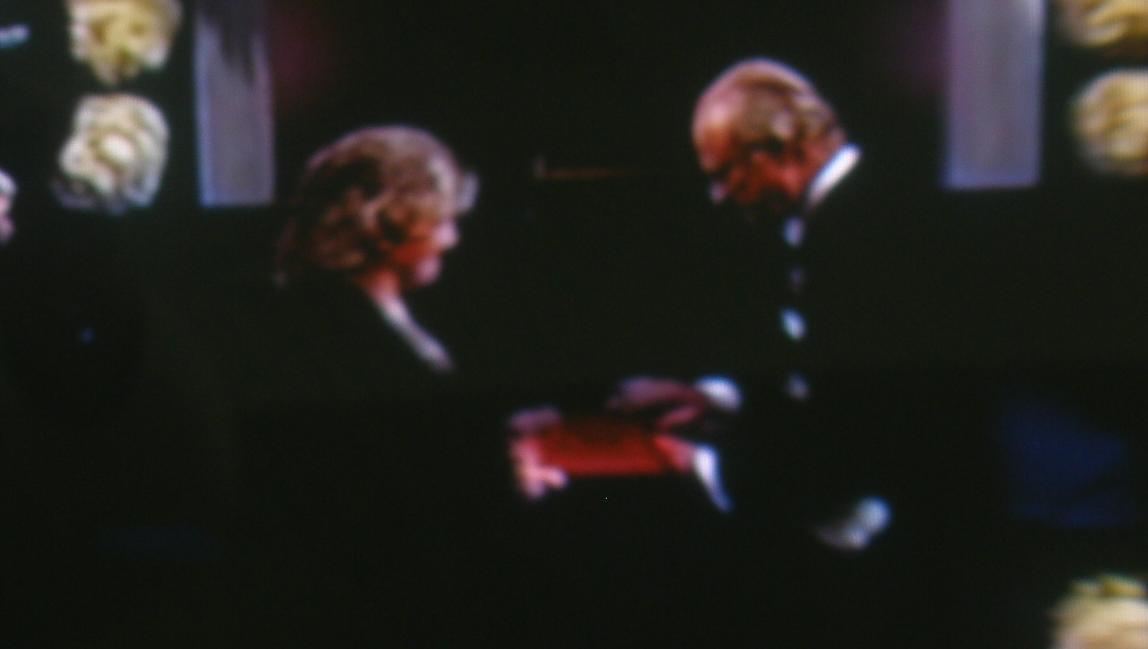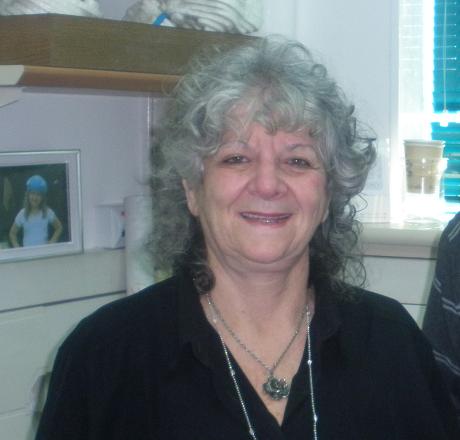Prof. Ada Yonat, winner of the Nobel Prize in Chemistry for 2009, in a special interview with the Hedaan website just before the Nobel Prize ceremony that will take place today (Thursday) in Stockholm

As a child, Prof. Ada Yonath admired Marie Curie, who this week she is walking in her footsteps to the stage of the Nobel Prize in Chemistry, the fourth woman in total to win the prize. However, this admiration did not help her in chemistry classes. In a joint interview with the scientist website and Galileo magazine held last week at the Weizmann Institute, just before her trip to Stockholm, she says: "The chemistry teacher called me a head of cabbage. In fact the whole class was the biggest cabbage head. He loved me a lot, especially when he decided I was talkative and would take me out and I would wash the dishes in the lab. So he would take me out without a peep. He would enter the classroom - today we will learn about salts, a witness to the laboratory."
Q: At what age did you think you wanted to do chemistry?
Prof. Yonat: "I never thought I would be involved in chemistry or science at all. I didn't know there was a profession called a scientist. I knew that you study science at university but then you go to work in laboratories, hospitals, factories. I didn't know exactly what scientists do after they study, I have to say I didn't go into it in depth. I did not have time. I also knew that you had to go to university to be a high school teacher. While in the army I learned to be a teacher in a public school and I knew that in order to teach in high school I needed another certificate. I didn't know that there are people who come to do what interests them and get paid for it."
"I wanted to go to a kibbutz because that's what I thought was needed in Israel. But my mother was really sick and it was difficult for her, so I had to work to help with the family's needs. My sister is nine years younger than me. When I was twenty, she was only 11. My mother lost all the family's capital after receiving the key fee for the apartment in Jerusalem, and intended to use the money to pay for the apartment in Tel Aviv, on the way, between the moment she got on the bus in Jerusalem and the moment she got off in Tel Aviv The great devaluation of 1952 took place and the value of money shrank by a third. It was all the capital of the family. I thought that if I went to the kibbutz I would not be able to help support the family. The university did not cost me and I received all the scholarships possible and also several awards and even worked in my spare time in all kinds of small jobs and I earned more than my mother who was a clerk in a government office with a low salary. "
In my first degree I studied chemistry because I loved this subject alongside my love for physics. When I came they asked me to list priorities. I listed chemistry first as a priority and physics second (because there were far too many candidates and it was difficult to get accepted to chemistry anyway) and mathematics third - everyone who studied a real major was accepted there, what is today called 5 units. During the year many students retired.
And so it happened that I studied chemistry in my bachelor's degree. Then I saw that there is also physical chemistry so I relaxed a bit. I had the same story with biochemistry. I liked this profession more than the other chemistry - organic, inorganic.
We didn't study much biochemistry in the undergraduate degree, but I was more interested in understanding the processes of life than the processes that occur in stones. So for my master's degree I enrolled in biochemistry and then I saw that within biochemistry there was one place for biophysics, I enrolled and was accepted. I liked it a lot, but even when I was doing my master's I didn't think about a scientific career or myself as a scientist. Until then I knew the scientists as teachers. When I got here to the Weizmann Institute and saw them, I said good, we'll do a doctorate, and that's how it continued.
How Prof. Yonat was almost a rocket scientist in Raphael
In response to my question about the things published according to which she was actually almost fired from the institute at one point, Prof. Yonat said that when her initial period of work as a young scientist at the Weizmann Institute ended, she was almost fired from the institute, but no one bothered to tell her this. "Whoever was the personnel manager at the time informed the library and the other parties that I was ending my position, only I was not informed of this and I had to hear from others."

The period was shortly after the Yom Kippur War. During the war, Yonat advised Rafale personnel on how to write software in order to increase the accuracy of their missiles, and in the middle of the dismissal process from the Weizmann Institute, the same personnel manager (who Yonat prefers not to mention) receives an offer for a permanent position of Ada at Rafale for an unlimited period. "He passed the information on to the scientific secretariat and they extended my appointment as a junior scientist for another two years only after a week, he gently hinted to me that there was a call from a doctor who wanted to interview me." Prof. Yonat summarizes.
More details from the interview that will deal mainly with the scientific aspect will be published in the January issue of Galileo magazine. In the interview, she talks about the achievements and the difficulties that were on the way to deciphering the structure and function of the ribosome, and about the race of three laboratories that achieved the goal at the end of 1999. In particular, the competition from the laboratory of Prof. Thomas Steitz at Yale University. This laboratory has much greater resources than Prof. Yonat's laboratory at the Weizmann Institute, which is reflected, among other things, in the number of scientists and researchers employed in the laboratory, 35 Bale compared to a limited number of positions at the Weizmann Institute. However, many more people were involved in the research, even those who contributed small sections of the work, which in some cases were important, she praises all of them equally in her lectures. This week she will have a festive opportunity to thank them in the traditional Nobel lecture, in which each winner tells about his most important discovery, and the path he took to reach it.
- More of the topic in Hayadan:
- Prof. Yonat: Natural selection also played a role in the probiotic world (before the development of life)
- A celebrity is more important than a professor - Prof. Yonat's press conference after the announcement of her win
- Polar bears and drunken ribosomes
- The ribosome - the key to life at the atomic level - translation of the review explaining why the Nobel Prize was awarded to the discoverers of the ribosome, including Prof. Ada Yonat - part XNUMX
- The ribosome - part XNUMX of the review
- To Part C of the review, in which there is a description of Yonat's discovery about the Dead Sea bacterium
- To the fourth and last part of the review, and further details on Prof. Yonat's discoveries

13 תגובות
As I mentioned - in my experience this is really not a problem.
If you are a good teacher, the problem is usually the opposite and you often have to refuse students who request lessons or reduce the frequency of lessons per student.
The question is not whether an hour of the day is a load,
Unless you get enough students to support an hour a day.
Absalom:
come on! Is one lesson a day hard to give? It doesn't get any easier than that! When I gave private lessons there was never a day when I gave less than three lessons.
To reach an income of 3000 NIS per month and assuming you are a gifted teacher who manages to collect 150 NIS from his students, you need to give 5 lessons a week every week.
This is definitely a non-trivial number and we haven't talked about time overheads yet.
Assistant positions are probably not given in the first year and not exactly in the second from what I know.
Absalom:
Really only an anecdotal description appears but you have to take into account the fact that a talented student has more free time than others.
Although my children did not have to work while studying, they had a lot of free time and I have no doubt that they could have earned quite a bit of money.
On second thought - I even remember right now that my oldest son worked for a while for fun and prepared lesson plans for an online teaching company, but I have no idea how much he earned there. I'll have to ask him sometime.
Think about giving private lessons: it's a very profitable business with flexible working hours and you can earn much more than NIS 3000 a month.
It is also important that those who hold any position at the university (and excellent students can get such positions) such as an exercise checker - after all, in addition to the salary he receives (for very light work) he is also exempt from tuition fees (at least that's how it was while I was studying).
I admit that there is only her anecdotal description,
"I worked small jobs in my free time."
I compare this with the student jobs available today and I see that to work in them and earn, say, NIS 3000, you need much more than work in your free time.
Absalom:
You don't get my point.
Don't you also accept her claim that she worked all kinds of small jobs?
Do you think she would have worked for them if the scholarships had been enough to support her?
Michael, did they receive enough of a scholarship to the point that it would constitute a salary + exemption from tuition fees?
I think that is not the case today.
Or in other words, I don't accept your "elitist" theory. In my opinion, the study conditions simply changed.
And many people who were in Yonat's situation as described in the interview with her today would not have been able to afford to study.
Absalom:
And what's the wonder?
Not everyone gets scholarships. This is something that is given only to the outstanding.
I can tell you that even nowadays the outstanding ones get a lot of scholarships.
I won't give myself as an example because I'm not from "our day" but my two sons also received every possible scholarship during their undergraduate studies.
There is no doubt that a wonderful woman,
I was interested in one single point that I think is important to present,
The matter of the scholarship, that key point, which was mentioned in passing in the article,
She seems to present a situation that is different from that of many undergraduates these days.
A wonderful woman